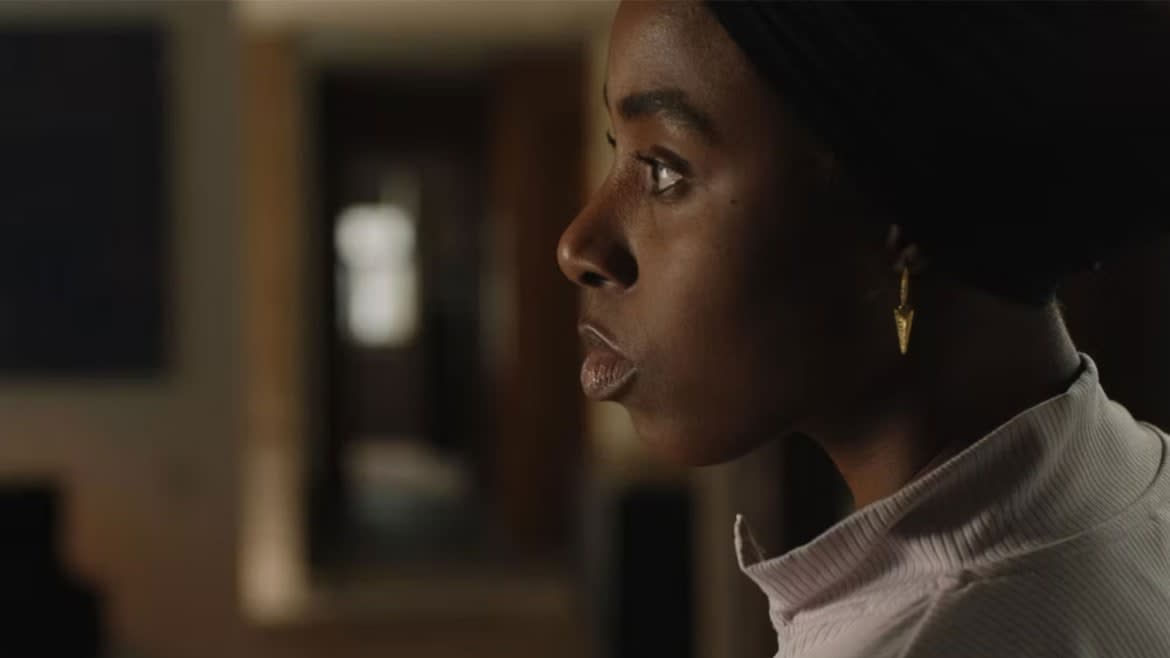The Disappointing ‘We Strangers’ Keeps Outsiders at a Distance

How far can one lie take you? That’s the question at hand in Anu Valia’s feature film debut, We Strangers, which premiered at the SXSW Film Festival March 9. It’s also the primary query that clouds Valia’s film, which spends its brief 80-minute runtime attempting to stretch one fabrication across an otherwise sparse, shallow narrative.
We Strangers is an intimate character study of a woman named Ray (the talented, mononymous Kirby), who works as a cleaner and housekeeper in Gary, Indiana. After Ray is hired by Dr. Neeraj Patel (Hari Dhillon) to clean up the building he’s purchased for his new practice, Dr. Patel asks her to do some work around his house as well. While there, Ray—who initially prefers to keep to herself and listen to Tinashe while cleaning (like any self-respecting person does!)—meets Dr. Patel’s wife Tracy (Sarah Goldberg), daughter Sunny (Mischa Reddy), and eccentric neighbor Jean (Maria Dizzia). Ray can’t help but notice Jean’s peculiar behavior around the not-so-good doctor, eventually deducing that she might be his mistress.
This is never explicitly stated in We Strangers. In fact, little narrative detail is ever specifically conveyed; Valia prefers to let the subtext do the talking. And while this makes for an intriguing first half of the film, the lack of clear character detail thwarts its momentum in its latter portion.
In ‘Bob Trevino Likes It,’ a ‘Euphoria‘ Star Finds Herself a New Dad on Facebook
That impediment is particularly frustrating, given that the central lie in We Strangers feels like it has so much potential just waiting to be extracted from it. One day, while cleaning Jean’s house (a gift from Dr. Neeraj), Ray observes Jean watching Monica the Medium. Out of nowhere, Ray blurts out that she, too, can sense the dead, which lures the gullible Jean into Ray’s microscopic fib. This lie is an impulsive decision that speaks to Ray’s generalized discontent with her position in life, but one that Valia spends too little time trying to work through.
Valia’s attempts to convey Ray’s dissatisfied-but-headstrong mindset through crossfading dissolves and wipe transitions. Eventually, these charming directorial decisions feel as though Valia is working her way through a book of novelty editing tricks to distract the viewer from her lack of a fully fleshed idea. What Ray wants, it seems, is purpose; she craves a way forward in life and a modicum of control over her universe that isn’t merely ephemeral. But Valia’s script doesn’t scratch hard enough. It’s admirable that she doesn’t overtly seek to indict the moronic people Ray pulls into her orbit, or Ray’s own malaise. However, that lack of conviction leaves We Strangers feeling middling and totally unfocused, grasping at too many ideas instead grabbing a few truly compelling ones.
Make no mistake: There’s plenty of talent on display throughout We Strangers, both from its writer-director and skilled cast. Valia’s brilliant use of color frequently grounds a film that too often feels like it’s floating in space. It’s just disappointing that her trained eye for detail appears more often in the film’s rich oranges, greens, purples, and yellows than it does in her screenplay.
Kirby is another highlight, delivering an adept, subtly refined performance. Even without specific spoken details to illuminate Ray’s mindset, Kirby can convey her character’s quiet restlessness among her white employers without any words. But Dizzia and Goldberg are far too underutilized, doing the best they can to elevate the comedic undertones in Valia’s script with little written wit to work with.
A Group of Artists Built an Apartment Inside a Mall, and No One Noticed
It’s that feeling of something integral being missing that keeps the film from ever fully reaching its potential. We Strangers constantly tries to hold onto something that was never there in the first place. It’s a movie that’s sort of about community, sort of about racial assimilation, and sort of about the lies we tell ourselves and others to wrestle with life’s mundanity. These thematic elements spend 80 minutes begging for more focus, only for We Strangers to remain content with its abstraction. While that conceptual nature keeps the film from being outright boring, it doesn’t save Valia’s initially promising feature from eventually souring to something disappointing.
Get the Daily Beast's biggest scoops and scandals delivered right to your inbox. Sign up now.
Stay informed and gain unlimited access to the Daily Beast's unmatched reporting. Subscribe now.


